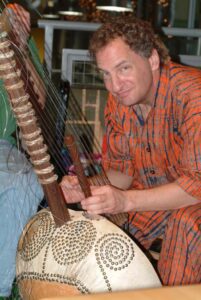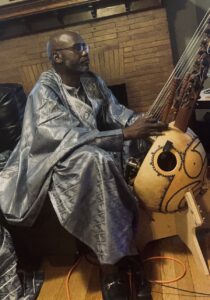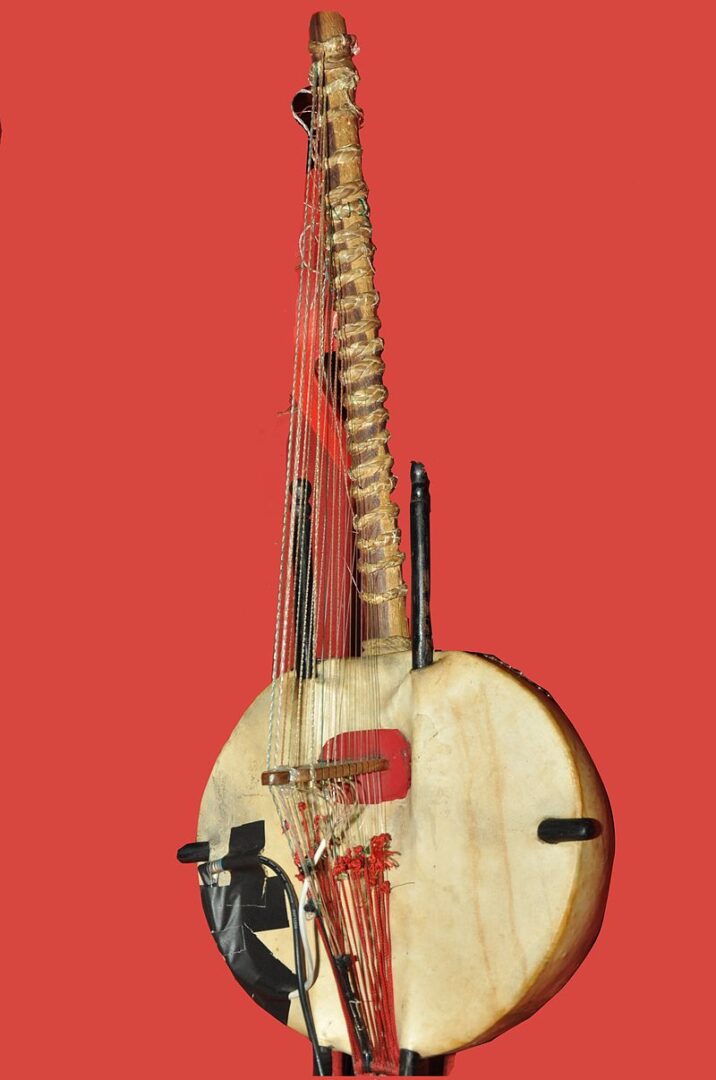Musicians For Musicians (MFM) Presents: “Music Is Essential” ZOOM Webinar #13 with Kora Musician David Gilden and Special Guest Sherif Sissoko – A Musical Introduction to the Mandinka Kora.
Report by Dawoud Kringle
On Tuesday, March 21, 2023, MFM presented its 13th Music is Essential webinar. The guest speakers were David Gilden and Sherif Sissoko. The topic of the talk centered around the Mandinka Kora from a musician’s perspective
 David Gilden discovered the Kora back in 1978 at a concert with Malian kora player Batourou Sekou Kouyaté at the Smithsonian Museum of Natural History. It was this performance that inspired David to play and research the kora. In 1989 David traveled to The Gambia to study the Kora with his first teachers Malamini Jobarteh and Dembo Konte. Later in1995 David traveled to Bamako to visit Kora virtuoso Toumani Diabate and Batourou Sekou Kouyaté. During this trip to Bamako, David met Sherif Sissoko, an accomplish kora player, presently living in Hartford Connecticut, who is the younger brother of acclaimed kora musician Ballake Sissoko.
David Gilden discovered the Kora back in 1978 at a concert with Malian kora player Batourou Sekou Kouyaté at the Smithsonian Museum of Natural History. It was this performance that inspired David to play and research the kora. In 1989 David traveled to The Gambia to study the Kora with his first teachers Malamini Jobarteh and Dembo Konte. Later in1995 David traveled to Bamako to visit Kora virtuoso Toumani Diabate and Batourou Sekou Kouyaté. During this trip to Bamako, David met Sherif Sissoko, an accomplish kora player, presently living in Hartford Connecticut, who is the younger brother of acclaimed kora musician Ballake Sissoko.
MFM’s Adam Reifsteck hosted.
David began with a brief introduction, and then he played some music on the kora. It was truly beautiful. He followed this with an explanation of the construction of the kora. It is interesting to note that the strings are made of fishing string of various gauges, and its tuning is entirely diatonic. This was followed by some music played by Sherif. He played the same song David did (I prefer not to attempt a transliteration of the song’s title). His rendition was equally beautiful, yet had some noticeably different qualities.
beautiful. He followed this with an explanation of the construction of the kora. It is interesting to note that the strings are made of fishing string of various gauges, and its tuning is entirely diatonic. This was followed by some music played by Sherif. He played the same song David did (I prefer not to attempt a transliteration of the song’s title). His rendition was equally beautiful, yet had some noticeably different qualities.
David continued with an anecdotal account of how he learned of the existence of the Mandinka Kora. The story goes back 40 years to when he was a student at the Berkeley School of Music. After hearing a live kora concert at the Smithsonian, he found himself enamored by the music. He traveled to Africa in order to study this music. He went into detail about his studies and adventures learning the kora. He also shared some dialogue with our African music expert Banning Eyre, and how this music was documented. One interesting piece of information that was shared was how to properly record the kora. I recommend watching the video for details of this fascinating story.
David then adjusted his webcam so the viewer could get a close look at his hands while he demonstrated kora playing techniques. Those familiar with string instruments will immediately notice that the mechanics of playing a kora are unique, and a deeper look will reveal how it relates to many other instruments of African origin that one does not see elsewhere.
At this point, David relinquished the stage to Sherif. Here, we are given a perspective from the inside; David is someone who discovered the music and the instrument. Sherif’s perspective is from the inside. This was his culture and was something intensely personal. David knows how to explain the tradition in western terms, while Sherif’s discourse sounded like a man talking about his hometown.
Toward the end of the talk, David played a little, then took some questions form the participants. One of the questions was posed by Sohrab Saadat Ladjevardi, MFM President. He asked how a western (or Persian) musician could integrate kora music into a non-African musical setting. This is an important question, because it not only acknowledges the validity of the African tradition, it seeks to build a bridge between traditions. David replied by saying that Mandinka kora music uses (for the most part) F as a tonic. Once this is established, one can find the middle ground. As long as one can find a common ground, one can make music with anyone.
Roger Blanc asked about the tuning and structure of the modes / scales used in this music. David said that there is some variety in the temperaments of 2nds, 3rds, etc. This is due to several circumstances, mainly related to performing outside the traditional music.
The talk ended with Sherif playing a beautiful piece on the kora. The only criticism of what he played was that it was too short.
The talk demonstrated one of countless examples of how connections can be made across the artificial boundaries humans create. It is an expression of unity manifested as a multiplicity.

